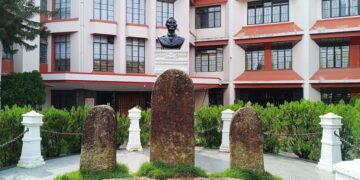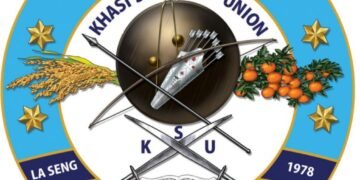The ninth annual conference of the Oral History Association of India (OHAI) on “Mountain History: At the Intersection of Memory, Politics and Identity,” was inaugurated by Education Minister Rakkam A. Sangma, at the North Eastern Hill University (NEHU), here today.
Hosted in collaboration with NEHU’s Department of Journalism and Mass Communication and the Northeast India AV Archive of St Anthony’s College, and supported by the Sasakawa Peace Foundation, Japan, this conference intends to explore India’s rich regional histories and cultures, focusing on the often overlooked narratives from the mountain and mountain communities.
The conference intends to explore India’s rich regional histories and cultures, focusing on the often overlooked narratives from the mountain and mountain communities. The conference seeks to rectify this imbalance by delving into the socio-cultural and political histories of these diverse landscapes that emerge through the oral histories.
The conference, which will continue for two more days, focuses on the intersections of mountain studies, social and cultural histories, indigeneity and politics through oral histories. It encourages questioning of the categories like ‘tribal’ and ‘indigenous’, and unpacking the diverse narratives of and on mountains as well as explore how these constructions are often displaced in larger political articulations of state and administration.
Speaking at the inaugural ceremony, Sangma emphasised on the need to be rooted to one’s culture while also sharing concerns over the erosion of one’s age-old oral traditions, highlighting the challenges in preserving the rich oral culture of the tribes of the North East.
He also informed about the attempts of the state Education Department to introduce a curriculum where students starting from the elementary level of schooling will be taught about the rich culture of Meghalaya.
NEHU Vice Chancellor Prof. Prabha Shankar Shukla, applauded the organisers for bringing together a galaxy of eminent scholars, academicians, researchers and scientists from all over the country in one room. “It is a testament to unity in diversity’” he said and reminded the participants to “listen with empathy, question with curiosity”.
OHAI President, Vrunda Pathare shared the history of OHAI and how it came into being during a conference in the year 2013.
She shared the challenges faced by oral historians across country. “Everyone was using oral history but there was no structure or methodology”. However, the success of OHAI conferences which is conducted all over the country gives the oral historians the “ownership of their own narratives”, she said.





























